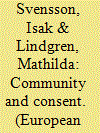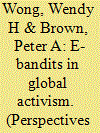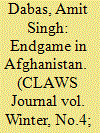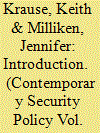|
|
|
Sort Order |
|
|
|
Items / Page
|
|
|
|
|
|
|
| Srl | Item |
| 1 |
ID:
103669


|
|
|
|
|
| Publication |
2011.
|
| Summary/Abstract |
This study explores popular challenges against the state through nonviolent means. Although previous research has started to examine the effect of these 'unarmed insurrections', the relationship between challenging the state apparatus (vertical legitimacy) and the state identity (horizontal legitimacy) has not been adequately addressed. We argue that unarmed insurrections are most likely to be successful when challenging the vertical, rather than the horizontal, legitimacy of the state. Studying data for 287 years of protests in 57 non-democratic countries during the period of 1946-2006, we find support for three implications of this proposition: 1) campaigns that demand governmental regime change are more successful than campaigns for territorial changes; 2) success is less likely when the identity of the insurgents and the government is split along ethnic lines; and 3) success is less likely when society is highly polarized along ethnic lines rather than being ethnically homogeneous. Thus, when the community is divided, the efforts to withdraw consent will be less effective. The study discusses the implications of these findings for policymakers and scholars interested in nonviolent strategic action.
|
|
|
|
|
|
|
|
|
|
|
|
|
|
|
|
| 2 |
ID:
126320


|
|
|
|
|
| Publication |
2013.
|
| Summary/Abstract |
In recent years, WikiLeaks and Anonymous have made headlines distributing confidential information, defacing websites, and generating protest around political issues. Although many have dismissed these actors as terrorists, criminals, and troublemakers, we argue that such actors are emblematic of a new kind of political actor: extraordinary bandits (e-bandits) that engage in the politics of no one via anonymizing Internet technologies. Building on Hobsbawm's idea of the social bandit, we show how these actors fundamentally change the terms of global activism. First, as political actors, e-bandits are akin to Robin Hood, resisting the powers that be who threaten the desire to keep the Internet free, not through lobbying legislators, but by "taking" what has been deemed off limits. Second, e-banditry forces us to think about how technology changes "ordinary" transnational activism. Iconic images of street protests and massive marches often underlie the way we as scholars think about social movements and citizen action; they are ordinary ways we expect non-state actors to behave when they demand political change. E-bandits force us to understand political protest as virtual missives and actions, activity that leaves no physical traces but that has real-world consequences, as when home phone numbers and addresses of public officials are released. Finally, e-banditry is relatively open in terms of who participates, which contributes to the growing sense that activism has outgrown organizations as the way by which individuals connect. We illustrate our theory with the actions of two e-bandits, Anonymous and WikiLeaks.
|
|
|
|
|
|
|
|
|
|
|
|
|
|
|
|
| 3 |
ID:
126297


|
|
|
| 4 |
ID:
090429


|
|
|
|
|
| Publication |
2009.
|
| Summary/Abstract |
The study of non-state armed groups (NSAGs) has traditionally been limited to those actors with a political agenda that pose a specific threat to the state and undermine its ability to claim a monopoly over the legitimate use of force within its territory. In contrast, this introduction - and the articles that follow - expands upon this narrow conceptualization and redefines NSAGs to encompass such actors as militias, warlords, private security providers, urban gangs, and transnational and criminal networks. This understanding facilitates a wider exploration of how such groups form in relation to the state, and how the state in turn is shaped through its interactions and conflict with the armed group(s). This article provides an overview of a set of research issues, frameworks, and methods that represent a starting place for a broadened agenda on armed groups which moves beyond those actors who mount direct challenges to the Weberian state. A more nuanced understanding of the different forms and historical trajectories of the interactions between armed group and states also highlights the dynamics through which various types of violent actors influence the use of force and violence in contemporary world politics.
|
|
|
|
|
|
|
|
|
|
|
|
|
|
|
|
| 5 |
ID:
113807


|
|
|
|
|
| Publication |
2012.
|
| Summary/Abstract |
This article develops a model for analysing international regime formation in the environmental domain. It is argued that current approaches to understanding how regimes emerge and develop are too narrow, and fail to account for the dynamic interplay between states and markets which induce the emergence of 'tipping points' leading to more extensive and stringent international institutions. The article demonstrates the central role of tipping points in regime formation using the example of international climate change.
|
|
|
|
|
|
|
|
|
|
|
|
|
|
|
|
| 6 |
ID:
110909


|
|
|
|
|
| Publication |
2012.
|
| Summary/Abstract |
On 2 May 2011, a team of US Special Forces executed an operation against Osama Bin Laden in Pakistan. The extraterritorial use of force against a non-State actor in the territory of another State with the aim of using lethal force against an individual is recognized as the phenomenon of targeted killings. Such operations exist on two levels: the extraterritorial use of force in the territory of another State and the use of lethal force against an individual. However, such operations also appear to blur and challenge boundaries within the international legal framework. This paper aims to clarify the existing rules within international law which govern targeted killings. The operation against Bin Laden will be used as a study to facilitate understanding of the legal considerations which arise in assessing the prohibition and permissibility of Targeted Killings under the existing framework of international law. This paper will examine the official US position under international law on targeted killings and the operation against Bin Laden to identify the legal justifications put forward. The paper will then continue to examine these legal justifications under existing frameworks in international law from three legal regimes which come into play: (i) jus ad bellum; (ii) jus in bello; (iii) International Human Rights Law.
|
|
|
|
|
|
|
|
|
|
|
|
|
|
|
|
|
|
|
|
|